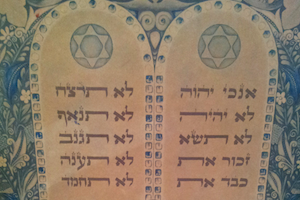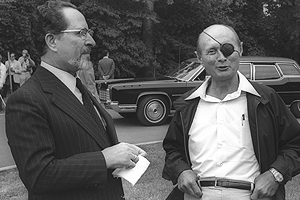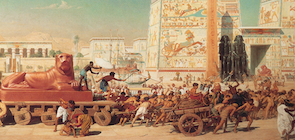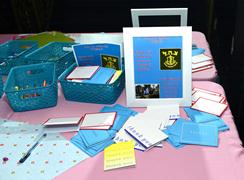10 Commandments of Jewish Heritage
By Sally Berkovic

The 10 commandments, received on Shavuot, are conceptually divided as commandments between God and Man (e.g. loving God, obeying God) and those between Man and Man (e.g. not to kill, steal or commit adultery) Another term for God is Makom, literally ‘place’ and this essay offers a complementary set of 10 commandments that are between the Place and Man, and between Man and Man (and of course, Woman).
Jewish heritage refers to everything that touches upon Jewish life, culture, art, ritual, history and literature, everything that touches upon Jewish space and Jewish time. A Jewish language, a Jewish building, the Sabbath, the rise of Zionism, Sephardi wedding dress, cantorial music, your grandmother’s Passover plate, an illuminated manuscript, and in our digital age, Jewish websites are all part of a broad definition of Jewish heritage.
This essay introduces a set of 10 commandments – and like any Jewish text, could and should be debated, argued and developed further.
1. Thou shalt not treat every old, derelict synagogue as sacrosanct
Caring for a synagogue – a commandment between Place and Man – requires manpower and funds. A synagogue is known as a Beit Knesset – a house of gathering for the community – but if there is no community, then who is it for? The complexities of synagogue renovation, the ongoing issues of maintenance and the spiralling costs of these projects mean that difficult, and often unpopular, decisions need to be made regarding synagogue survival.
2. Thou shalt draw on the stores of knowledge contained in Jewish cemeteries and be programmatic about their ongoing preservation
There are still hundreds, if not thousands of unmarked cemeteries without fencing or appropriate signage, strewn with overgrown weeds and filled with faded or chipped tombstones. Cemeteries without advocates fall prey to the property developers who want the land to build upon and without legal representation or communities to defend the cemetery, it may prove difficult to prevent their use for other purposes.
3. Thou shalt guard your archives and implement an effective collection policy
In the digital age, there are challenges regarding born digital archives and ephemeral material. Are emails an archive? And are the online menus from the wide array of kosher restaurants worth saving so that, in time, someone will be able to write a social history of the food Jews used to eat? While archives are particularly important for researchers studying the past, it takes prescient community leaders to organise archives for the future.
4. Thou shalt acknowledge the complex role of museums and encourage their on-line presence
Jewish museums have an important socio-political role to play in exploring the tensions between universalism and particularism, i.e. other communities could learn to reflect on their own experiences of immigration, acculturation and assimilation from the Jewish experience. However, events in the last few months, including the attack on the Jewish Museum in Brussels, should make us wary of platitudes that museums are a panacea and a cure-all for peace between nations.
5. Thou shalt listen, record and document the voices of experience
We are a mobile people and those journeys and languages mean that we have interacted with so many others over time and capturing these stories complements the view we get only from the buildings we inhabit or the ritual objects that we use.
6. Thou shall not make it cool to visit the death camps
Handled sensitively, and placed within a context, there is great educational value in many of these trips. However, the psychologically manipulative nature of many of these trips to Poland (which is beyond the scope of this article and has been addressed by others) that uses the Holocaust for building and affirming Jewish identity can be problematic.
7. Thou shalt ensure appropriate, sensitive and multi-lingual signage
Designing thoughtful signage in at least two languages is an artful responsibility as that plaque is a micro-history lesson and the story it tells may be the only one that the visitor ever reads.
8. Thou shalt acknowledge and support the selfless individuals caring for Jewish heritage
Networks of expert mentors, training opportunities and online technology can help to motivate and encourage isolated staff caring for Jewish heritage.
9. Thou shalt integrate a broad understanding Jewish heritage into the contemporary Jewish educational landscape
The challenges of Jewish heritage are a valuable educational tool that can be creatively used to as a bridge between the religious and secular groups, between the engaged and unaffiliated within a Jewish community.
10. Thou shalt stay informed, think big, centralise information and embrace the digital age
Jewish heritage needs a global strategy defining an agreed set of priorities and an implementation plan over a designated timeframe. The digital age presents wonderful opportunities for capturing images of Jewish heritage and the long term preservation of Jewish related data. Co-ordination is crucial and duplication must be avoided.
It’s hard to keep the commandments – whether it be the original ones, or these suggested alternatives. Perhaps you can reflect on what aspect of Jewish heritage interests you and share ideas to ensure that your personal heritage and your community’s heritage is not forgotten and not lost.
Read the complete article on eJewishPhilanthropy
Share your thoughts:
Why isn't Israel a part of the 10 Commandments?
What would you change or add?
Were you a participant on a heritage trip in Eastern Europe and would you agree that the trips should end?
Do you think that fostering a connection with Israel should be included in the 10 commandments for Jewish heritage?







